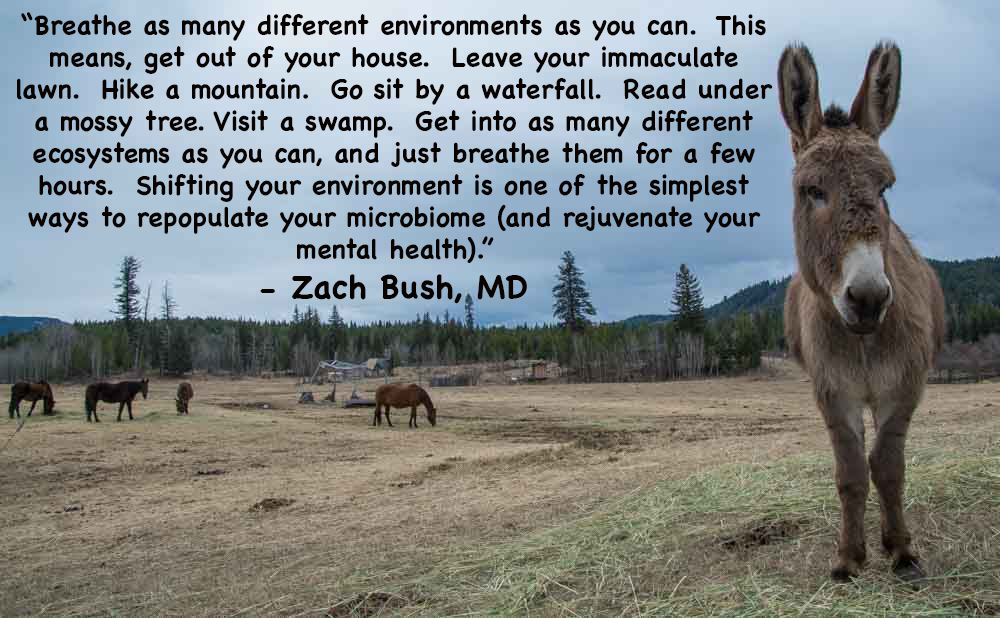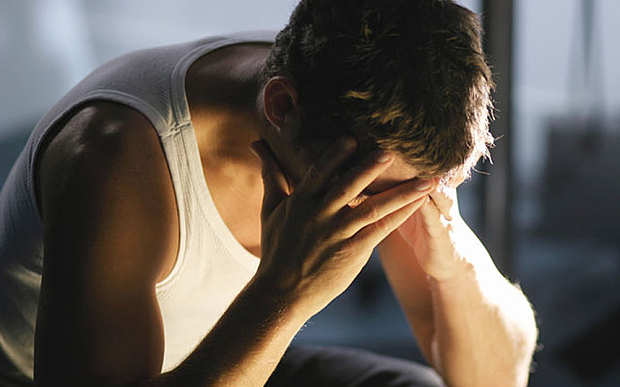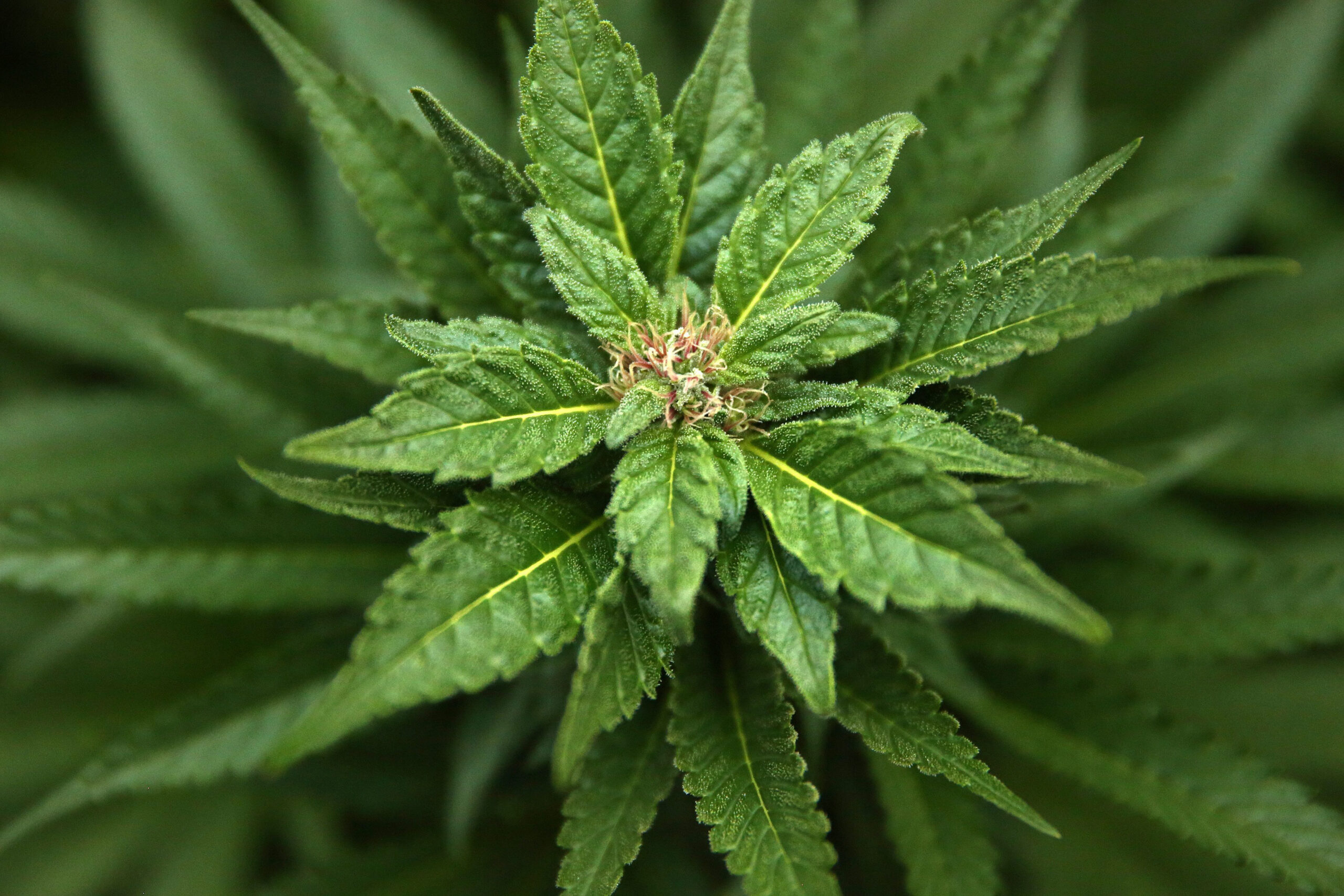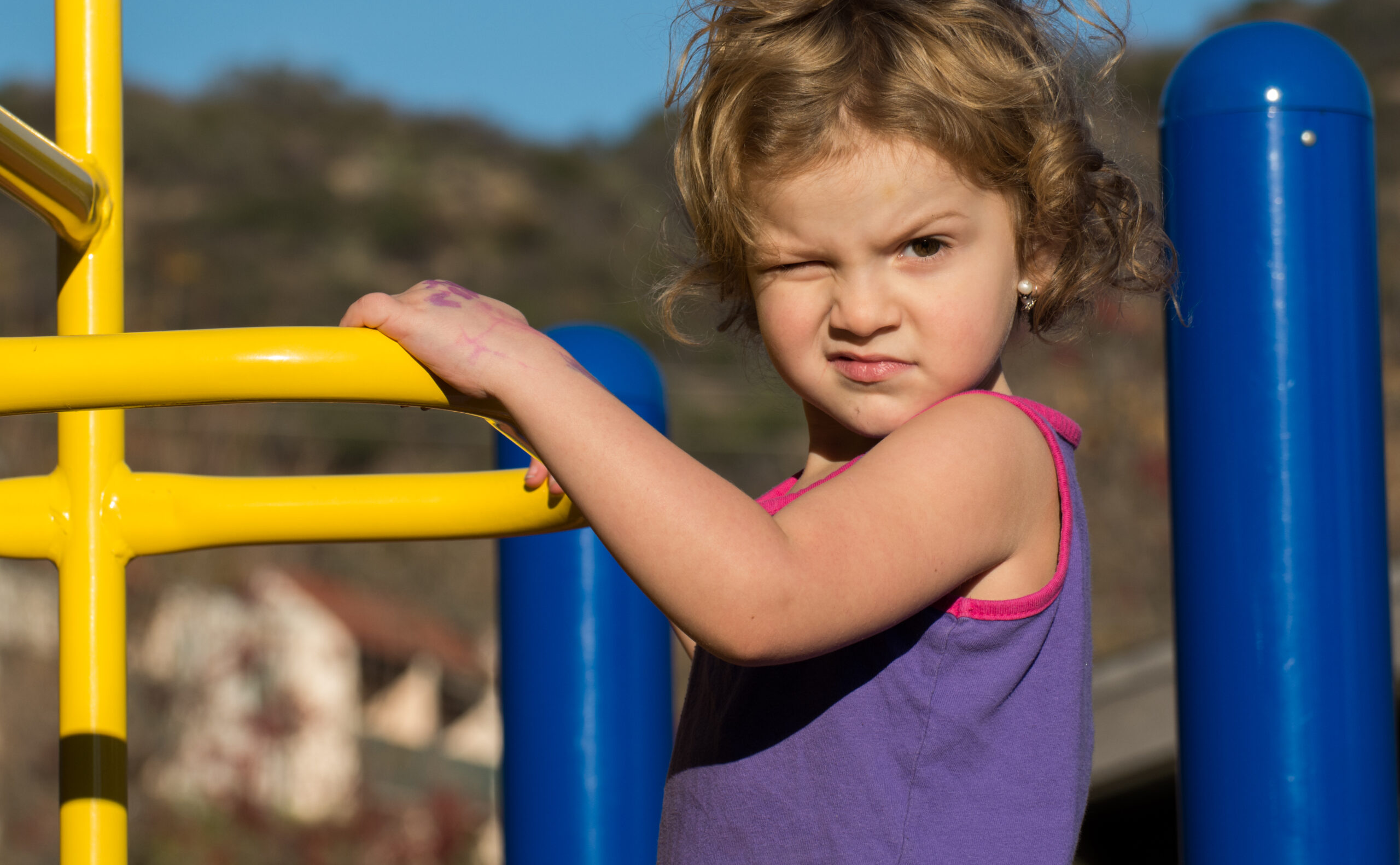greymouser
Stress, Depression and The News
Stop Watching the News
A friend of mine living in Los Angeles told me an interesting story. This happened about 15 years ago. He worked construction in the Hollywood area on higher end houses. While on the job one day, the client expressed that she was fighting ongoing depression, talking about how horrible the world was. After a someone lengthy conversation, my contractor friend asked how much news she listened to or watched. “Oh, all the time!” was the response. Morning news, newspaper, evening news, radio in the car, etc. He asked if she was willing to take a challenge which after his explanation, she accepted. This was the challenge: “Go two months without watching, reading or listening to the news. And then see how you feel.” She agreed. The job was finished at this point and he left her to her life, not really expecting to hear. Or at best, maybe in a couple of months. A week later, she, the client, called and said, “I haven’t felt this good in years”. No TV news, no radio and no newspapers. She had a completely new outlook on life. In just one week!
It doesn’t surprise me at all. Bombarding a person with bad news constantly can in no way be beneficial. There have been countless studies on the effects of news on depression, anxiety and other disorders. I’ve referenced a few below:
1. Article Title: The News Media and Psychological Distress
“Negative stress was directly related to anxiety and depression. News media exposure and anxiety were positively related at low levels of irrationality. News media exposure was predictive of trait anxiety at low levels of optimism.”
https://www.tandfonline.com/doi/abs/10.1080/10615800108248354
The ‘irrationality’ resulting from watching too much news is evident in arguments between friends that constantly occur on ‘sensitive’ subjects. (Politics, religion, etc.)
2. Article Title: A Systematic Review: The influence of social media on depression, anxiety and psychological distress in adolescents
“All domains correlated with depression, anxiety and psychological distress.”
https://www.tandfonline.com/doi/full/10.1080/02673843.2019.1590851?src=recsys
If your children are on Facebook they are going to be constantly exposed to bad news, telling them how the world is going to hell in a hand basket. Limiting use could save the use of harmful drugs like Ritalin, Prozac, Zoloft and others that often exacerbate depression and anxiety. Prevention is way better than most ‘cures’ out there. Maybe the right phrase should be ‘anti-social media’.
3. Article Title: How the Negative News Cycle Can Impact Mental Health
“The results indicated those respondents viewing news coverage for six or more hours were nine times more likely to report high acute stress levels than those with minimal media time.”
https://www.goodtherapy.org/blog/how-the-negative-news-cycle-can-impact-mental-health-1110152
Have you ever tried to have a rational conversation with a friend after they have been watching CNN or Fox for three days straight? Not going to happen. How communicative is your teenager after a full rainy day sitting on Facebook?
There is a lot of good in the world. There is an endless supply of really good people. Most are generally quite friendly and want good things for those around them. Happy to help. Too much bad news from the media can stop someone’s willingness to feel safe and communicate with others.
If you are finding yourself being a bit too miserable, reviewing how much time you are spending paying attention to the news or seeing alarming items on Facebook or other social media, then maybe you should take a moment to reorganize your life a bit. If you are constantly getting in fights regarding politics with friends, I’d say that it would be a very good time to, at least temporarily, withdraw from Facebook and turn the news off.
See, then, if your outlook changes at all. Give it a couple of weeks. You up for the challenge?
Why I Don’t Trust Big Pharma
Trust Big Pharma? I Don’t Think So!
Here are a few reasons why I don't trust the pharmaceutical industry
Opioid Crisis
The damage to society from opioids is something that is not in question. In an article on canada.gov,
“Measuring the impact of the opioid overdose epidemic on life expectancy at birth in Canada” shows that in the USA and also in British Columbia “a decrease in life expectancy due to opioid drug overdose deaths.”
In researching it was difficult to find individuals that were more interested in curtailing the production or addressing the causes of the epidemic. Most of the articles that I can find speak of making it safe for addicts to do the drugs: “Harm reduction.”
This article reviews a book called:
Overdose Heartbreak and Hope in Canada’s Opioid Crisis
by Benjamin Perrin, professor at University of BC
“From all of the information put forth in the book, Perrin makes a hard case that safe consumption sites are the answer. Getting people the support they need, giving them access to safe places to use drugs with people there to help if they need it. These sites are there to connect people to services and support. Perrin puts forth a strong argument to stop criminalizing people who use drugs, and how this would positively impact all levels of society, those who are taking the drugs and those who deal with the fallout from the illicit drug trade. Perrin also takes a hard look at the evidence for and against the decriminalization of all drugs, with Portugal giving some insight into how the strategy can play out. “
Heartbreak and Hope
This, as a solution, doesn’t really do anything to help the fact that there is a crisis. This solution, in no way prevents or slows the increase of people starting and using these deadly drugs. All this will do is increase the burden of society to support more and more drug addicts and their habit. I understand that many of these people, if not the majority, are not ‘street people’ and became addicted somewhat accidentally. So, let’s take this back a bit. When we were young and had a bone set or tonsils out, we weren’t prescribed opiates. After tonsils being removed, one got a little extra ice cream to soothe the throat. For the mending bone in an arm, say, one was instructed to be careful not to sleep on it. I had a greenstick fracture of my radius at age 14. Knocked out at the hospital to straighten it. That was it. I may have slept a little extra the first couple of days. Then I was out playing and going to school. Too busy to notice the pain, I guess.
This would be one of the first things one would think to do:
British Columbia Opioid Lawsuit
“B.C. sues opioid makers for 'negligence and corruption' about addiction risks”
“B.C. Attorney General David Eby spoke of the "terrible toll" opioid addiction has taken on many British Columbians and their families as he announced a lawsuit against pharmaceutical companies to reclaim costs associated with the ongoing opioid crisis.”
Purdue Pharma, the manufacturer of Oxycontin claims that it is not their fault, they claim no wrongdoing.
Simon Fraser University drug policy researcher Donald MacPherson: “MacPherson said the government should be working on providing a clean supply of opioids for people with addictions if it wants to stop the overdose crisis.”
Supplying ‘clean’ opioids to addicts will do nothing to prevent more and more people from becoming addicted.
And from the Globe & Mail:
There are doctors out there that would like to limit patients’ use of opioids, bring these patients off the drugs slowly, recommending other solutions or less addictive drugs for pain. But complaints and demands from certain public, and I’m sure influence from Big Pharma leads to this:
“British Columbia doctors treating patients with chronic pain will be required to prescribe opioids without limiting dosage or refusing to see patients who are on the medication that has come to be associated with illicit overdose deaths.” The Globe & Mail
Methadone:
https://www.cdc.gov/mmwr/volumes/66/wr/mm6612a2.htm
Methadone:
https://www.medscape.com/viewarticle/767338
In 2010, “It [methadone] accounted for 39.8% of single-drug OPR deaths.” (OPR - Opioid Pain Reliever)
https://www.drugabuse.gov/drug-topics/trends-statistics/overdose-death-rates
“Figure 3. National Drug Overdose Deaths Involving Any Opioid—Number Among All Ages, by Gender, 1999-2018. The figure above is a bar and line graph showing the total number of U.S. overdose deaths involving any opioid from 1999 to 2018. Any opioid includes prescription opioids (and methadone), heroin and other synthetic narcotics (mainly fentanyl or fentanyl analogs). Opioid-involved overdose deaths rose from 21,088 in 2010 to 47,600 in 2017”
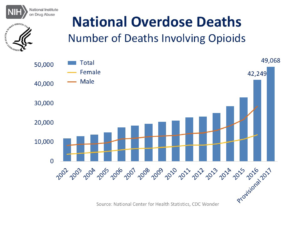
Above you will see this graph from the CDC website that shows increase from 8,048 in 1999 to 49,068 deaths in 2017. Not sure if these deaths include methadone. Either way this is a 600% increase in deaths in that time. Add in the data below, the unclassified opioid deaths, it will be a lot higher.
“Using this information, the team estimates that 72 per cent of unclassified overdose deaths involved opioids. This finding suggests that 99,160 more people in the US have died from opioid overdoses than previously thought, an underestimate of 28 per cent. According to these new results, a total of more than 450,000 people in the US have died from an opioid overdose since 1999.”
www.newscientist.com
This epidemic has been created by the pharmaceutical industry, one of the biggest culprits being Purdue Pharma owned by the Sackler Family. They still think they have done nothing wrong. If fact they are now producing “millions of doses of lifesaving opioid overdose reversal medications.” So, this family is responsible for the murder of thousands and destroyed families beyond measure, and they now make money from the medications to fix it!!
No small wonder that I don’t trust the pharmaceutical industry.
Add in the deaths resulting from prescription drugs and the total per the CDC is 70,237 in 2017.
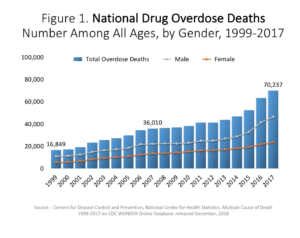
But from a study by Donald Light, who is a professor of comparative health policy at Rowan University School of Osteopathic Medicine in Stratford, New Jersey:
“Estimates dating back nearly two decades put the number at 100,000 or more deaths annually, which includes a study published in the Journal of the American Medical Association in 1998 that projected 106,000 deaths. A more recent analysis estimates 128,000 Americans die each year as a result of taking medications as prescribed – or nearly five times the number of people killed by overdosing on prescription painkillers and heroin."
and…
‘ “Donald Light, a medical and economic sociologist and lead author of a 2013 paper that detailed the estimate, entitled “Institutional Corruption of Pharmaceuticals and the Myth of Safe and Effective Drugs.” “About 2,460 people per week are estimated to die from drugs that were properly prescribed, and that’s based on detailed chart reviews of hospitalized patients,” ‘
That’s 2013. Times 52 weeks. That’s about 128,000 deaths per year. Numbers now, in 2020, would be much higher.
Add that to the 70,000 plus deaths from Opioids and other overdoses and you have a total of about 200,000 deaths per year directly resulting from carelessness and neglect of the pharmaceutical industry.
And these numbers are just in the USA.
Again, no small wonder I don’t trust the pharmaceutical industry.
This leads me to another so called controversial subject: vaccines. In 1986 a law was passed preventing Big Pharma from being sued directly. (The National Childhood Vaccine Injury Act) A ‘committee’ was set up where complaintants (usually parents of vaccine damaged children) could present their case. The lawyers that represent the defendants are Justice Department lawyers. Any money awarded is paid by the US Government (read: taxpayers). There is no jury and one person adjudicates.
Per fairwarning.org, as of 2018, $4.2 Billion has been paid out to families of children damaged by vaccines. Parents of the children affected are
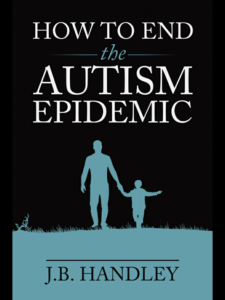
how to end autism epidemic
much more likely to get compensation if they don’t mention autism. There is an excellent book on the history of this mess written by J B Handley, called ‘“How to End the Autism Epidemic”.
(Note: As the Pharmaceutical Industry is protected by the The National Childhood Vaccine Injury Act of 1986, the money paid out comes from the US Government. Taxpayer’s money.)
Austism has gone from 1 in 10,000 in the 1960s/1970s to 1 in 36 in 2018. The numbers started to jump dramatically when Big Pharma became protected with the passing of the aforementioned law. at the same time increasing the vaccine rollout exponentially.
Every baby today is given about 72 doses of 16 vaccines (per CDC). In the 1960s and 1970s one received about 3-5 doses of vaccines. These numbers vary slightly depending on where you look but the point is starting in 1986 with the passing of the The National Childhood Vaccine Injury Act they increased by a factor of about 12.
The pharmaceutical industry has yet to admit any wrongdoing with regard to vaccines and autism.
But…
Who controls the narrative? I mean, who decides what you hear on the radio? What articles will you see in newspapers? What is going to get pushed in the 6 o’clock news.
Per the Periscope Group
“70% Of News Advertising Now Belongs to Big Pharma”
Media owners and editors are rarely going to bite the hand that feeds them.
“Are you still going on about that, that science is done! There is no proof of that! That’s a conspiracy theory.” - That is what you will hear if you try to counter Big Pharma’s narrative.
There is lots of information out there. But the majority of people will not do their own research, will unwarrantedly trust the media, doctors and researchers that are paid by pharmaceutical companies.
As you can see earlier in the article by some of the links, that much of the information available is on government websites. Not that difficult to find if you know where to look and are willing to look.
So, you can see that maybe, just maybe, there are some very good reasons to NOT trust the pharmaceutical industry and their supporters.
Is Marijuana a Drug?
Define Your Terms
Marijuana:
If we are going to talk about this, have a discussion, let us first define our terms.
Per:
https://www.drugabuse.gov
“Drugs can alter the way people think, feel, and behave by disrupting neurotransmission, the process of communication between neurons (nerve cells) in the brain.”
I was having a discussion on the subject of marijuana with someone a while back and it really wasn’t going anywhere, until I realized that while I considered marijuana a drug, he did not.
So, now if I'm ever in a discussion that is becoming an argument, I resort to this quote:
“If you wish to converse with me, define your terms” Voltaire
Marijuana, per pretty much any definition of the word ‘drug’ applies. There was a short saying years ago along the lines of, "If a horse has four legs and a tail and you call the tail a leg, then how many legs does it have? Still four. Just because you call the tail a leg, doesn’t make it a leg.”
"A drug is any substance (other than food that provides nutritional support) that, when inhaled, injected, smoked, consumed, absorbed via a patch on the skin, or dissolved under the tongue causes a temporary physiological (and often psychological) change in the body." (This definition compiled from Stedman's Medical Dictionary and Random House Dictionary.)
“something and often an illegal substance that causes addiction, habituation*, or a marked change in consciousness” - Merriam-Webster Dictionary (*Habituation: psychological dependence on a drug after a period of use” Merriam-Webster Dictionary)
So, marijuana alters the way you think, feel, and or behave. If you really want the technical data on how drugs such as marijuana affect the neurotransmitters in the brain, then read the full article at the link above. (drugabuse.gov)
The majority of people use marijuana in its various forms to get stoned.
I’m pretty sure that I’ve never seen or heard of an increase in consciousness or awareness with someone on marijuana. I’ve had many claim better judgement which never proves out in actual practice.
Redefinition of Terms
As with other controversial subjects, the redefinition of terms runs rampant with marijuana.
“It’s a Herb”
Commonly referred to as a herb so it is safe. This is an attempt to redefine pot as a ‘safe herb’. That doesn’t make it is so. Another herb that you may have heard of is Hemlock.
Hemlock has been used in the past medicinally but is extremely toxic and a very small amount can kill you. So, using the fact that marijuana is a herb and that is why it is safe, once you know the facts, destroys that argument.
Medical Marijuana
This is another redefinition of marijuana. In an attempt to get away from the fact that marijuana is a drug, those interested in marketing and selling it broadly, would have you believe there is a different version of marijuana that is ‘medical marijuana’, because adding the word ‘medical’ would obviously give it legitimacy.
There is no real difference between ‘regular’ marijuana and ‘medical’ marijuana. None.
“It’s Natural”
Marijana is so far from being ‘natural’ anymore. It has been bred constantly over the last 50-60 years for increased potency. Various breeding and growing techniques have not only increased the amount of THC (Tetrahydrocannabinol) - that’s the stuff that gets you stoned - but also have lowered the amount of CBD Oil (cannabidiol - that’s the stuff that mitigates the effects of the THC - lessens the effects) resulting in a drug that is many times stronger - ten to twenty time stronger or even more - than it was 50 plus years ago.
So, as I mentioned at the beginning, if you are going to discuss the subject of marijuana, establish your definitions first. If you find you are arguing about the subject and whether or not it is a drug, then establish your definitions. Save a lot of frustration.
Dark Waters (Movie)
The film Dark Waters
with Mark Ruffalo, Tim Robbins, Anne Hathaway
It is sometimes pretty scary that there has to be people in the world like Robert Bilott (the real life person that Mark Ruffulo portrays in the movie). It’s sad and worrisome that there is so much evil in the world and that people in a company like Dupont care so little of others that someone like Bilott has to pick up the gauntlet and act for the rest of us.
I’m not the best at critiquing movies, I leave that to my movie editor son. He is pretty good. He would likely be able to tell me why I liked it and why it kept me enthralled through the 2 hours and 6 minutes.
This is not meant to be a review but a hope that if you are reading this you will be inspired to do a little more to improve the world.
Sometimes doing something slightly less convenient can make a big difference it a lot of people do it. Good or bad. My wife and I hike a lot. We are in Canada. No matter where we hike, we see Tim Horton’s cups. Tim Horton’s, for those that are not aware is a huge coffee chain in Canada. It is rare that we go on a hike or to the beach and don’t see at least one of their cups strewn to the side of the trail.
One individual may think, “What is one cup?” Here are a few photos of what each of those individuals thinking that can do.
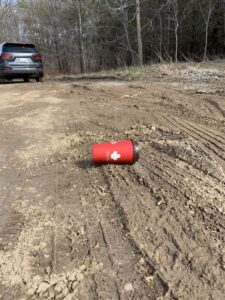
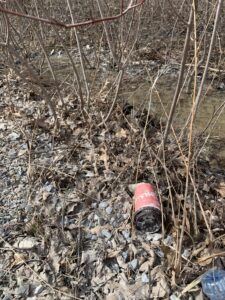
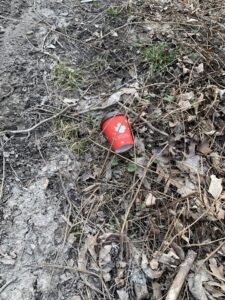
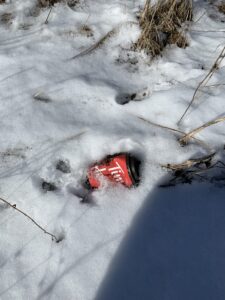
Flip that around. What if each of those people instead of casting aside their waste, picked up a bit of someone else’s. We might have a pretty clean environment. I like to hope that there are more good people than bad. It is just that sometimes the good don’t realize how bad the bad can be.
If one took the little extra effort and went to a coffee shop that allowed one to bring their own cup. Spend a little extra and buy the meat that is raised locally without hormones, etc. Find some small thing that you can do. Work with neighbours to clean up the litter. If it is only you and your spouse or kids, do it anyway. Set an example.
We are always cheering individuals like Robert Bilott and wishing there were more like him. Or not understanding why there is even evil to fight. But there is. Most of the time the real heroes are just the average person stepping up to the plate.
Most people won’t read an article like this. Most are really unaware that there is a problem. But if you started dragging your kids out to do some street or neighbourhood clean up instead of Saturday morning cartoons, whether or not others start to contribute, you will feel better.
Find good people in the community to support. Look for those helping kids, doing things to improve life around them and figure out a way to support them.
It does take some effort to get started. But once started it will be so fulfilling.
